Hey there Remodelaholics, Scott here with Saws on Skates back to make some more sawdust with you! This time we’re DIYing a project originally designed by Benjamin Franklin, a ladder chair! This looks like an ordinary chair but has a little surprise hidden inside. No spoilers here… you have to read on to learn about the surprise!

I love designing and building multifunction furniture. Just take a look at my DIY kitty litter cabinet. On the outside, it looks like an ordinary cabinet, but open the doors and you’ll find an ugly kitty litter box neatly hidden out of sight. Or take a look at my outdoor coffee table with four hidden side tables. It looks like an ordinary coffee table, but reach under the table, pull out the four small side tables and you have quadrupled the serving space for beverages and burgers!
That’s why I love Ben’s ladder chair. It looks like an ordinary chair, but flip the back part of the chair over the front part of the chair and it becomes a ladder. HOW COOL IS THAT!

My version of Benjamin Franklin’s ladder chair has an updated, modern look, but hints at his original design. The original ladder chair would have been constructed with mortise and tenon joints, but thanks to pocket hole joinery, this project is easy to assemble.

This little multitasker is great when you need a little extra boost in the kitchen. And at 5′ 4″ those upper cabinets are always out of reach for me!

How to Make a DIY Ladder Chair
Watch the video here or on our YouTube channel, and be sure to subscribe to see more DIY videos each week!
This post contains affiliate links for your shopping convenience. Learn more here.
Click Here to Get a Free Printable Version of This Building Plan
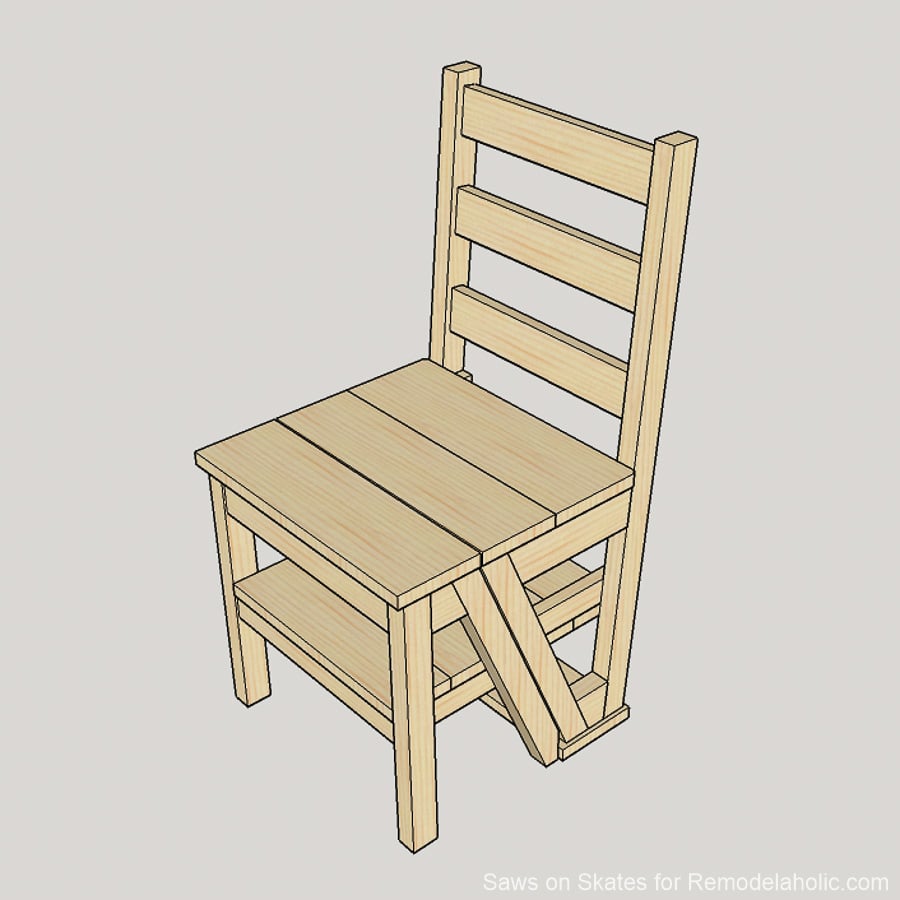
Supplies
- (3) 5/4x2x8
- (1) 5/4x3x8
- (1) 1x2x8
- (1) 1x2x8
- (1) 1x3x6
- (1) 1x4x6
- (1) 1x5x6
- (1) 1x6x6
- 1-1/4″ pocket screws
- 1-1/2″ pocket screws
- 1-1/4″ wood screws
- 2″ wood screws
- Wood glue
- 1-1/2″x12″ piano hinge
Note: I was not able to locate 5/4×2 at my local big box store. Instead, I ripped 5/4×4 to 1-1/2″.
Tools
- Tape measure
- Drill
- Kreg Jig
- Miter saw
- Jig saw, circular saw or band saw
- Table saw
- Countersink drill bit
- Pocket hole plug cutter (optional) or pocket hole plugs
Building Instructions
Step 1. Cut the Front Legs. Cut 2 pieces of 5/4×2 to 15-1/4″.
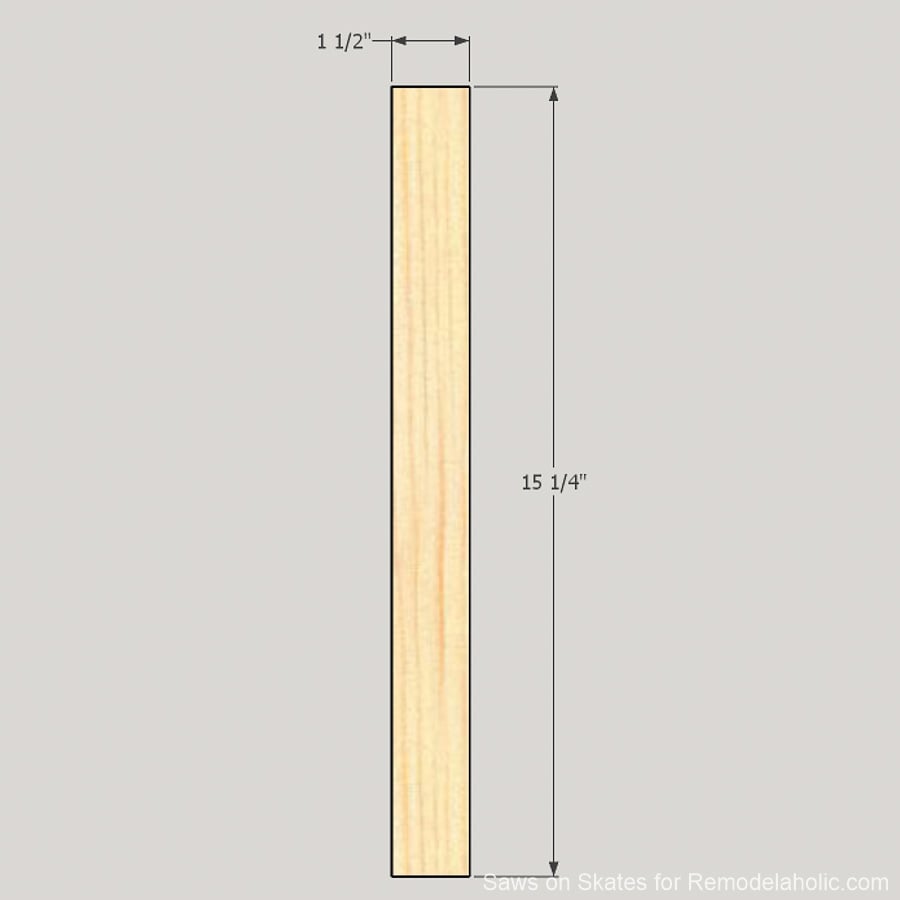
Step 2. Cut the Front Leg Rails. Cut a 22.5 degree angle on a 5/4×3, measure 2-1/8″ from the bottom of the angle and make 90 degree cut. Drill one pocket hole into the front edge of the rail. Repeat for the other rail. Be sure to make a right and a left.
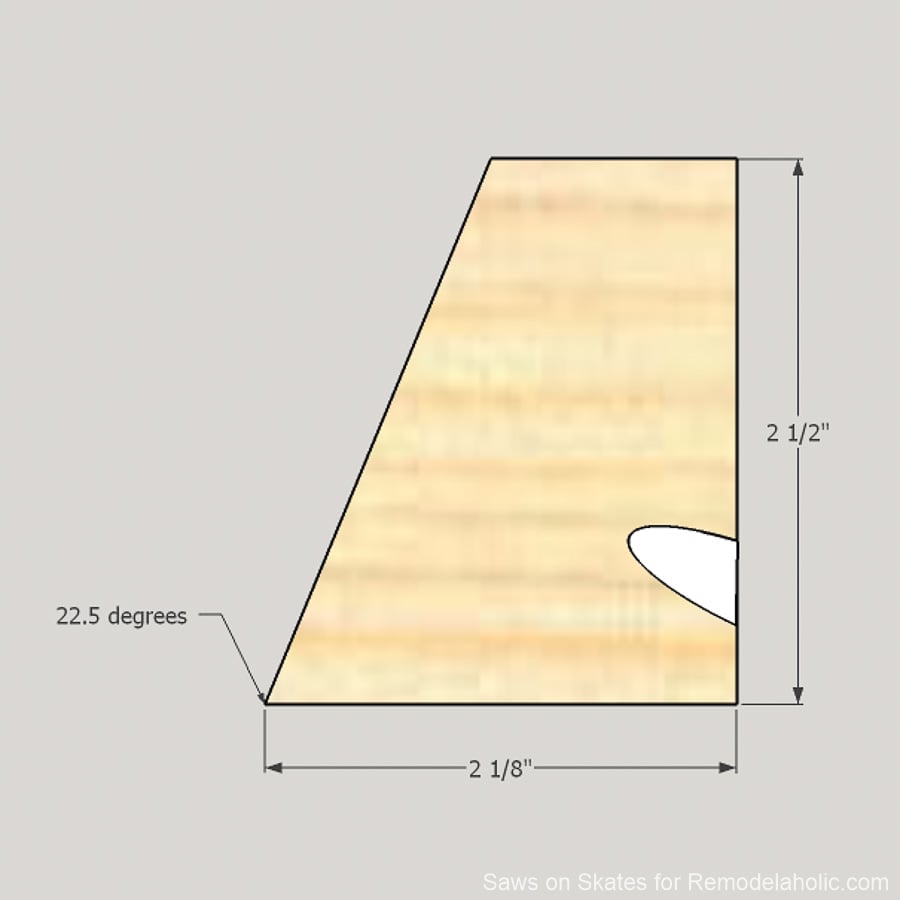
Step 3. Cut the Front Slanted Legs. Cut a 22.5 degree angle on a 5/4×2, measure 16-1/2″ and cut a parallel 22.5 degree angle. Measure 13/16″ on one end and make a 90 degree cut. This cut would be dangerous to make on a miter saw. I used my bandsaw to make this cut, but you could also use a jig saw or crosscut jig and a circular saw.
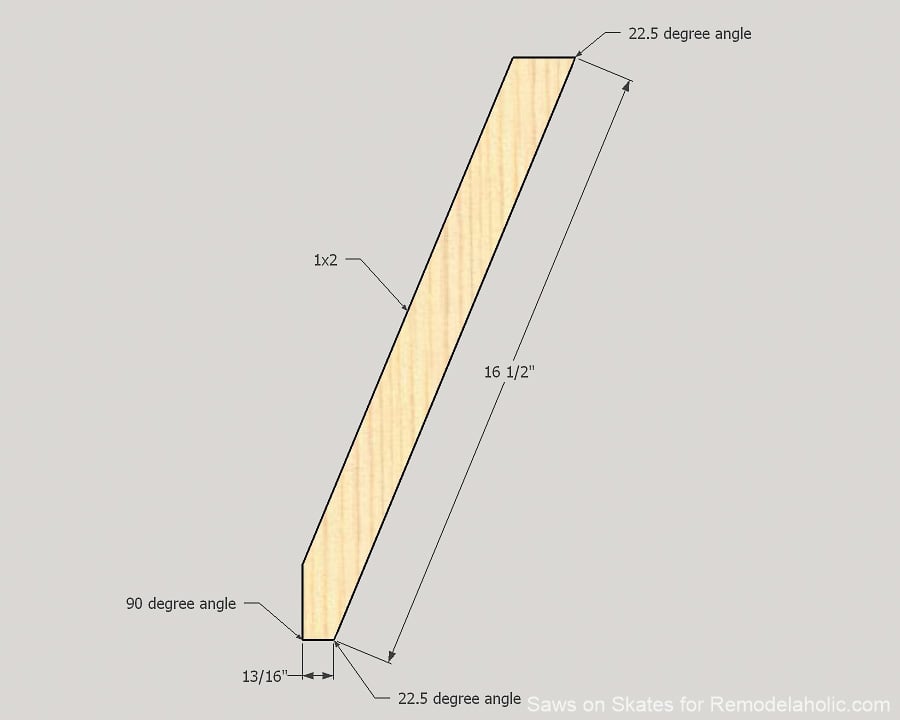
Step 4. Attach the Front Leg Rail to the Slanted Leg. Apply glue to the front leg rail, clamp and attach using a 1-1/2″ pocket screw. Place in your Kreg Jig and drill two pocket holes making sure to avoid drilling into the pocket screw. Repeat for the other side.
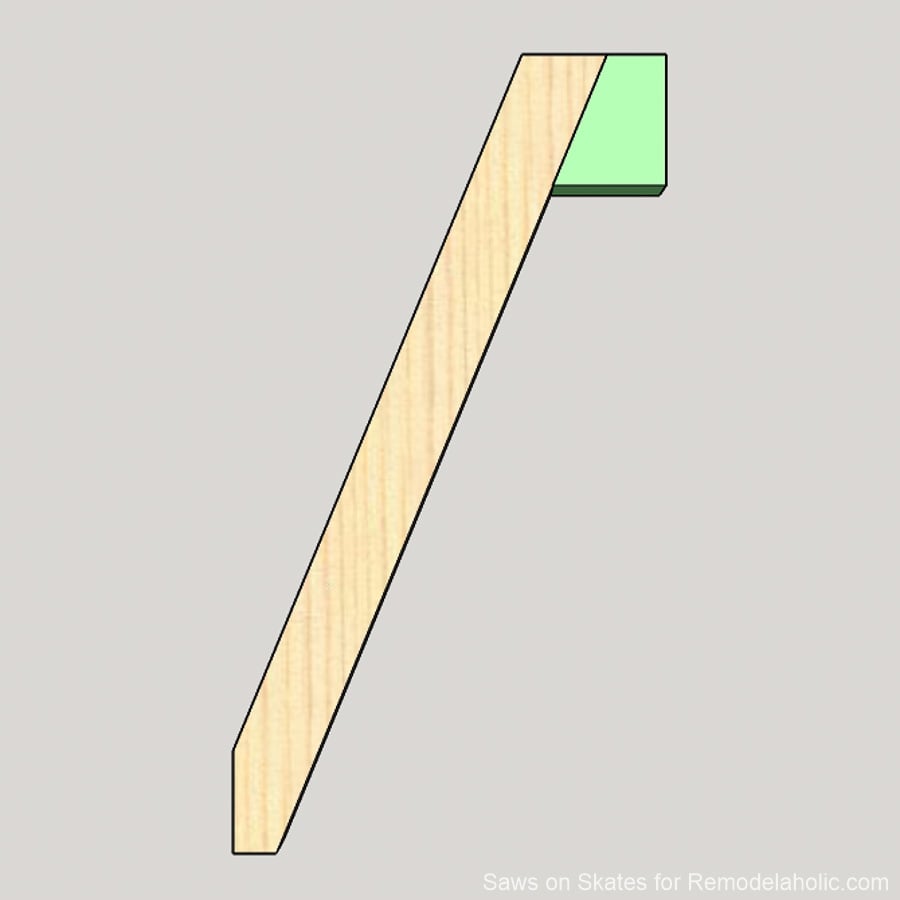
Step 5. Attach the Front Leg Assembly to the Front Leg. Apply glue to the front rail and clamp to the Front leg using the pocket holes drilled in Step 4. Attach using 1-1/2″ pocket screws.
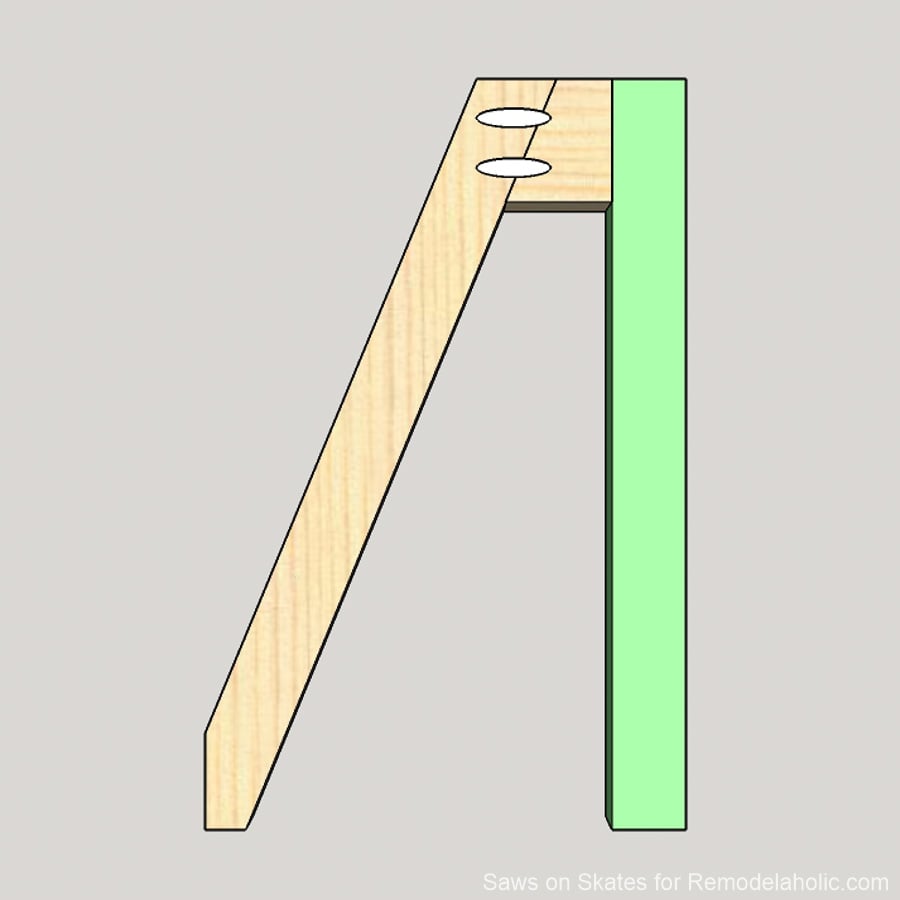
Step 6. Cut and Attach the Front Step Rail. Cut a 22.5 degree angle on a 5/4×3, measure 3-7/8″ from the top of the angle and make 90 degree cut. Drill two pocket holes in each end. Repeat for the other rail. Be sure to make a right and a left.
To help position the rails cut a piece of scrap wood to 6-1/8″ and clamp the scrap to the front leg. Apply glue to the ends of the rail, clamp in position and attach using 1-1/2″ pocket screws. Repeat for the other side.
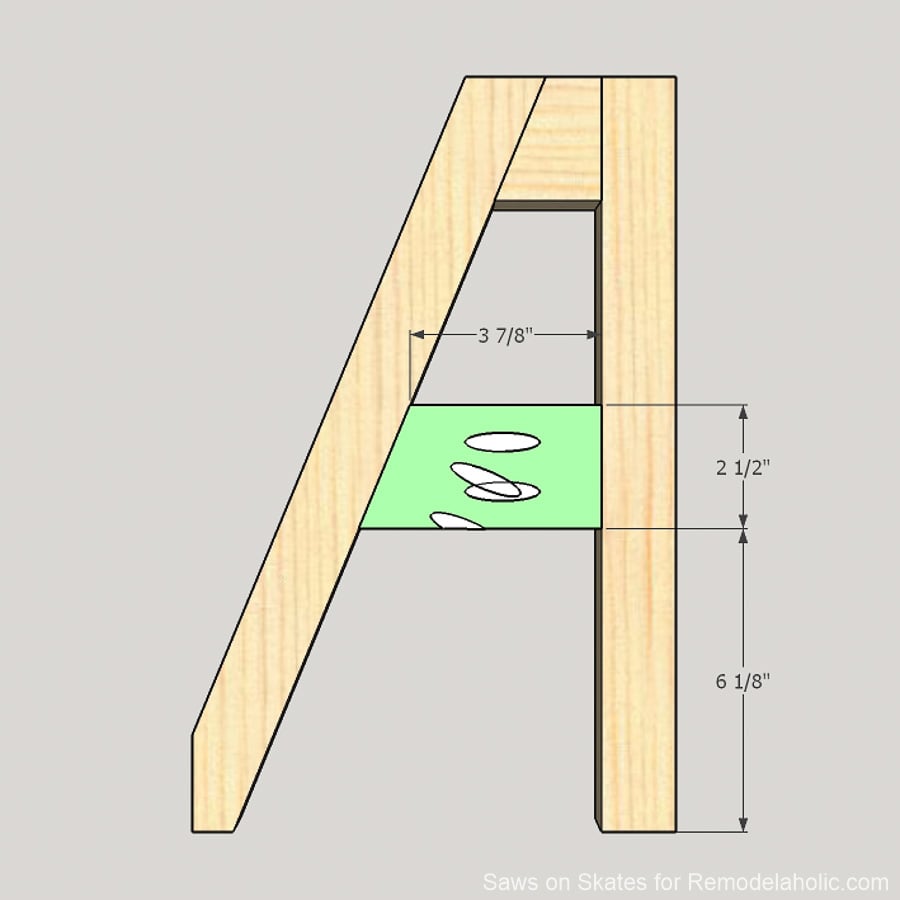
Step 7. Cut the Front Seat Rail. Cut a 5/4×3 to 13-1/4″. Drill pocket holes in each end and in one side.
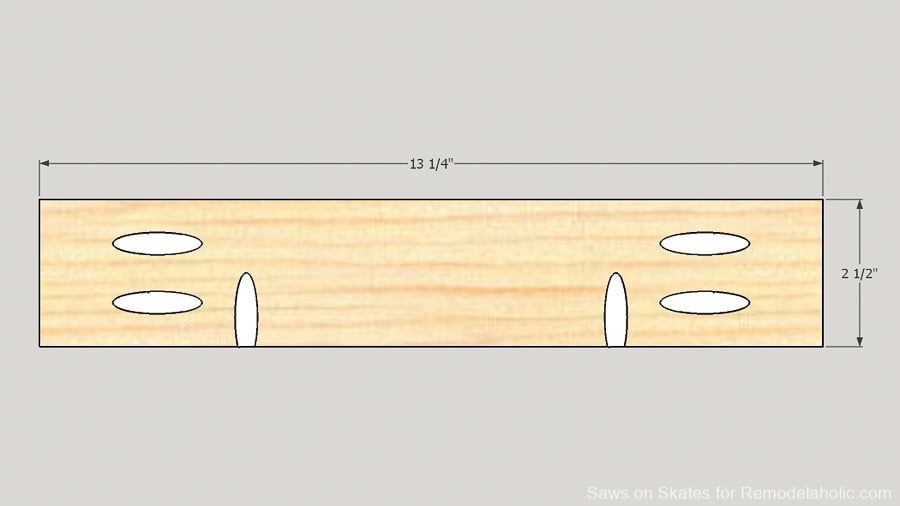
Step 8. Cut the Front Step Rail. Cut a 1×2 to 13-1/4″. Drill a pocket hole in each end.
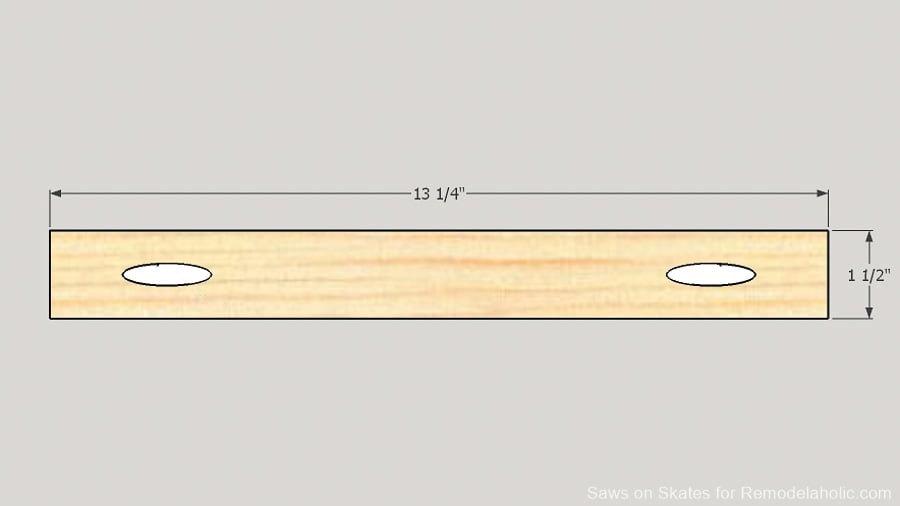
Step 9. Attach the Front Rails. I used some scrap 1/8″ hardboard to set the rails in from the front of the leg. To help position the step rail cut a piece of scrap wood to 5-1/8″ and clamp the scrap to the front leg. Apply glue to the ends of the rails, clamp in position and attach using 1-1/2″ pocket screws.
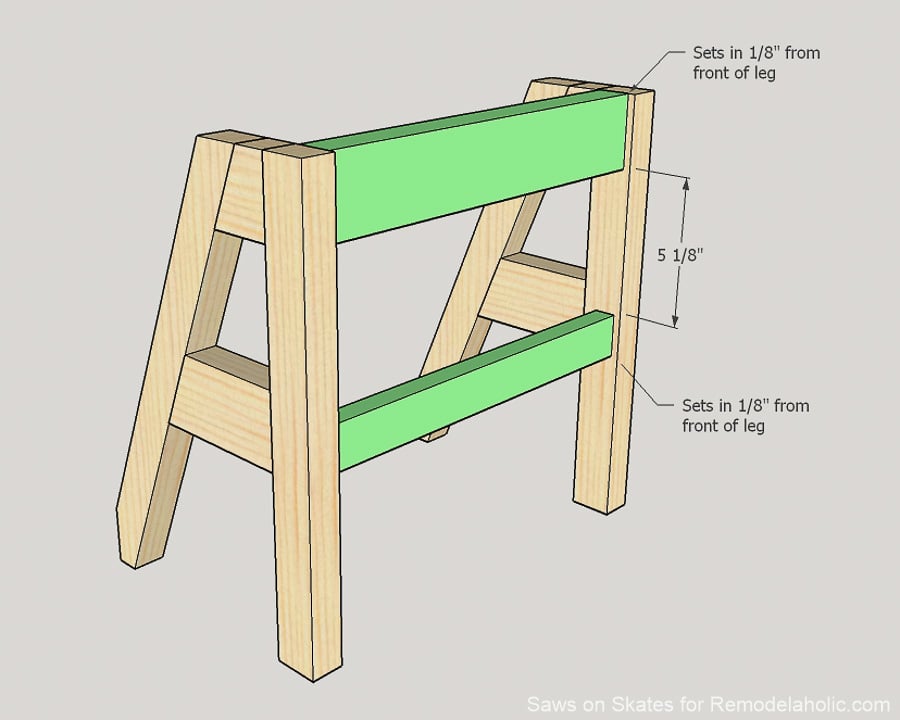
Step 10. Cut the Front Step Cleat. Cut a 22.5 degree angle on a 1×2, measure 6-9/16″ from the top of the angle and make 90 degree cut. You can also place a 1×2 in position, mark the angle and cut. This will ensure the best fit. Repeat for the other side.
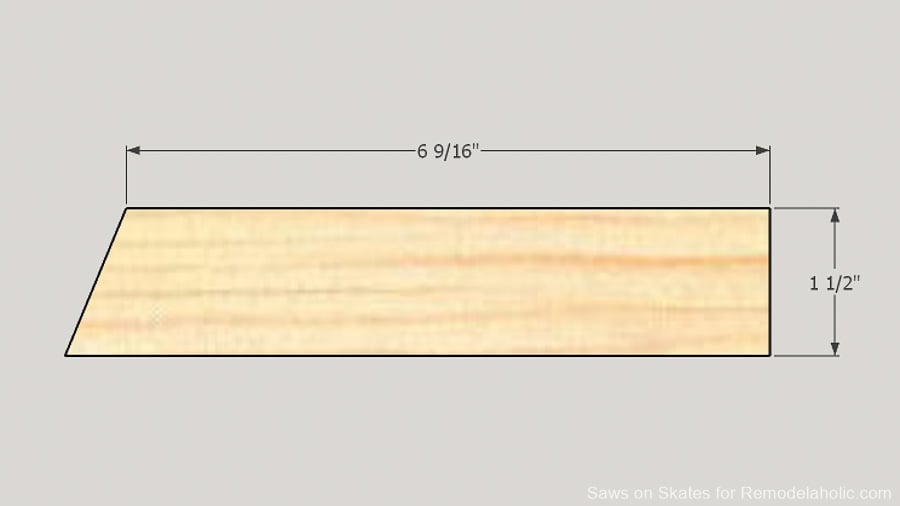
Step 11. Cut the Front Seat Cleat. Cut a 22.5 degree angle on a 1×2, measure 3″ from the top of the angle and make 90 degree cut. You can also place a 1×2 in position, mark the angle and cut. This will ensure the best fit. Repeat for the other side.
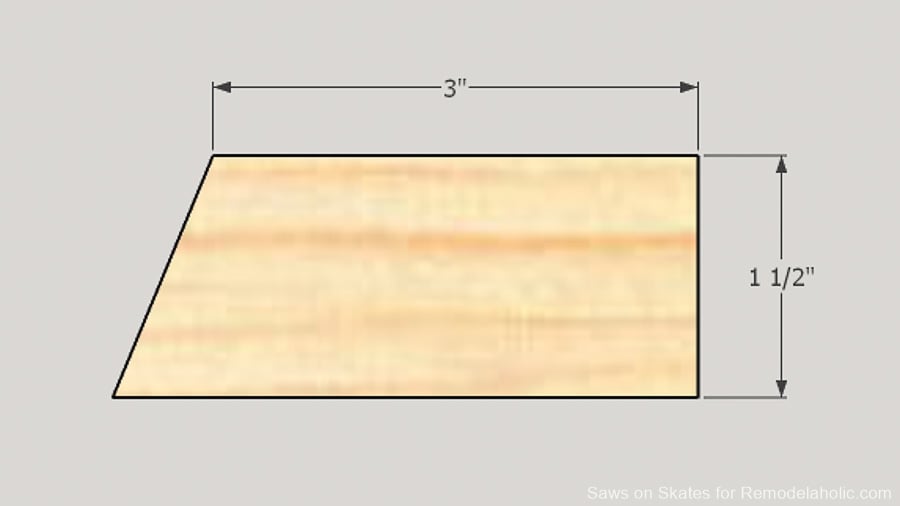
Step 12. Attach the Front Cleats. Drill countersink holes in the sides of the step and seat cleats. These holes will be used to attach the cleats to the legs. Be sure to make a left and a right. Then drill countersink holes in the bottom of the step and seat cleats. These holes will be used to attach the cleats to the step and seat.
Apply glue to the cleats, clamp in position and attach using 1-1/4″ wood screws. The top cleat is flush with the top rail and the bottom cleat is flush with the bottom rail.

Step 13. Cut and Attach Front Step Support. Cut a 1×2 to 11-3/4″ and drill a pocket hole in each end. Apply glue to the ends of the step support, place 2-1/4″ from the bottom of the step cleat and clamp. I used a right angle attachment on my drill to attach the 1-1/4″ pocket screws.

Step 14. Cut and Attach the Front Seat. Cut a 1×6 to 16″ and rip to 4-3/4″. The seat is flush to the back of the legs, overhangs the front of the legs 1/2″ and overhangs the sides of the legs 1/4″. Clamp in position. Attach to the cleats using 2″ wood screws and attach to the front rail using 1-1/2″ pocket screws.
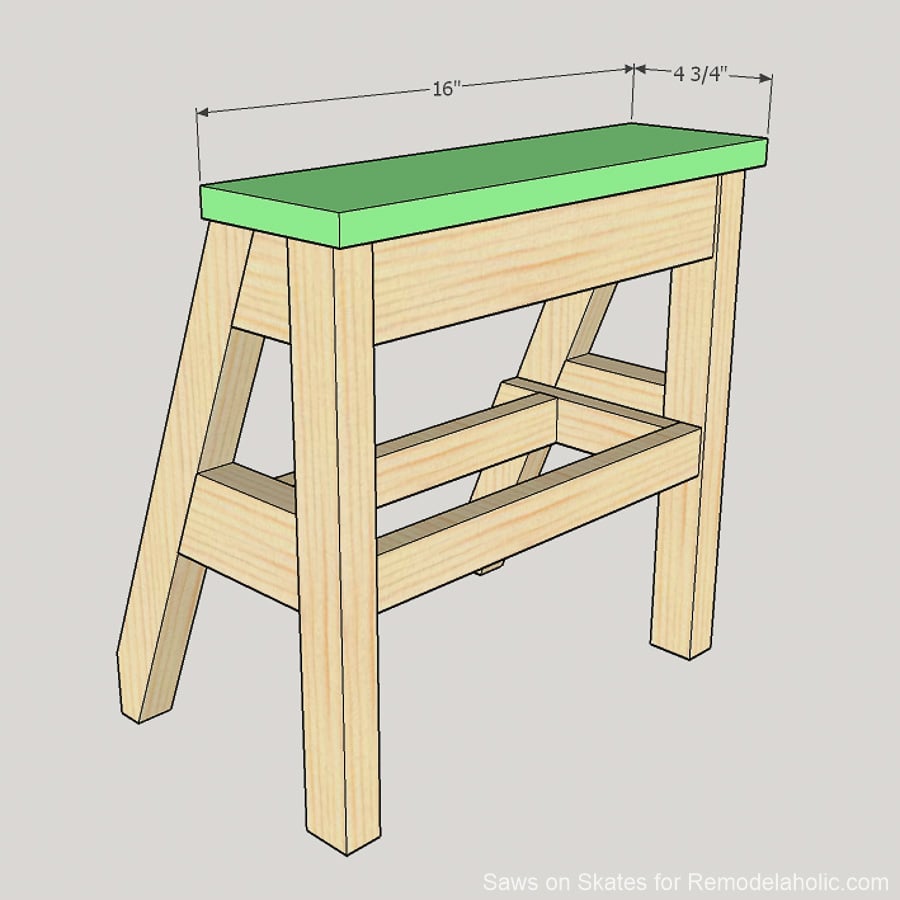
Step 15. Make and Attach the Front Step. Cut a 1×4 to 13-1/4″. Cut a 1×5 to 13-1/4″. To make the step, drill pocket holes, apply glue and attach using 1-1/4″ pocket screws. Place the step flush with the front of the legs and mark the angle at the back of the legs. Using a table saw or circular saw, cut a 22.5 degree angle at this mark.
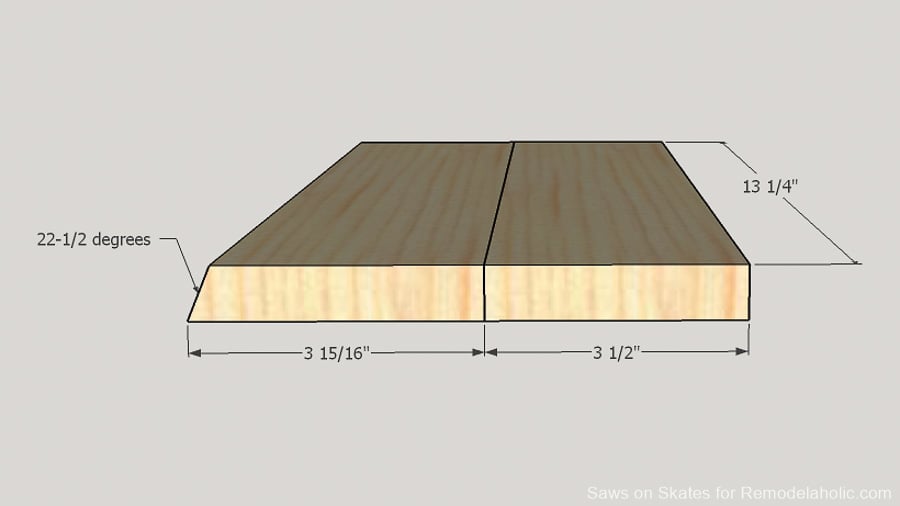
Clamp in position. Attach to the cleats using 2″ wood screws and attach to the front rail using 1-1/2″ pocket screws.
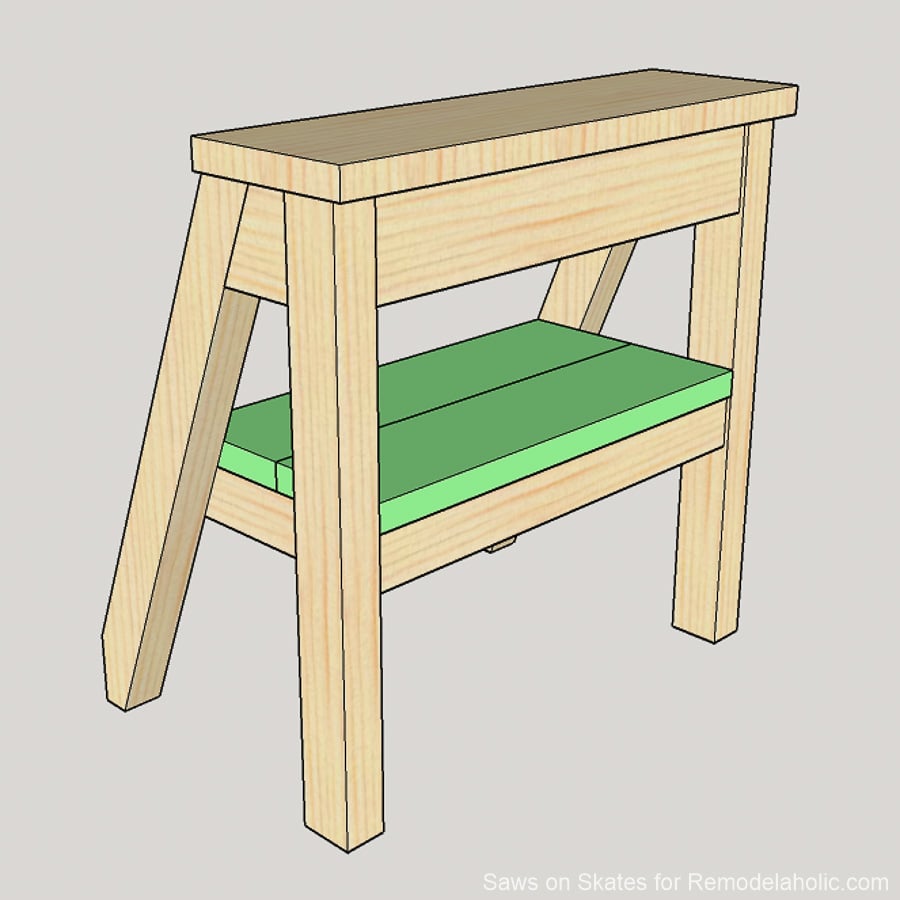
Step 16. Make the Back Leg. Cut a 22.5 degree angle on a 5/4×2, measure 15-11/16″ and cut a parallel 22.5 degree angle.
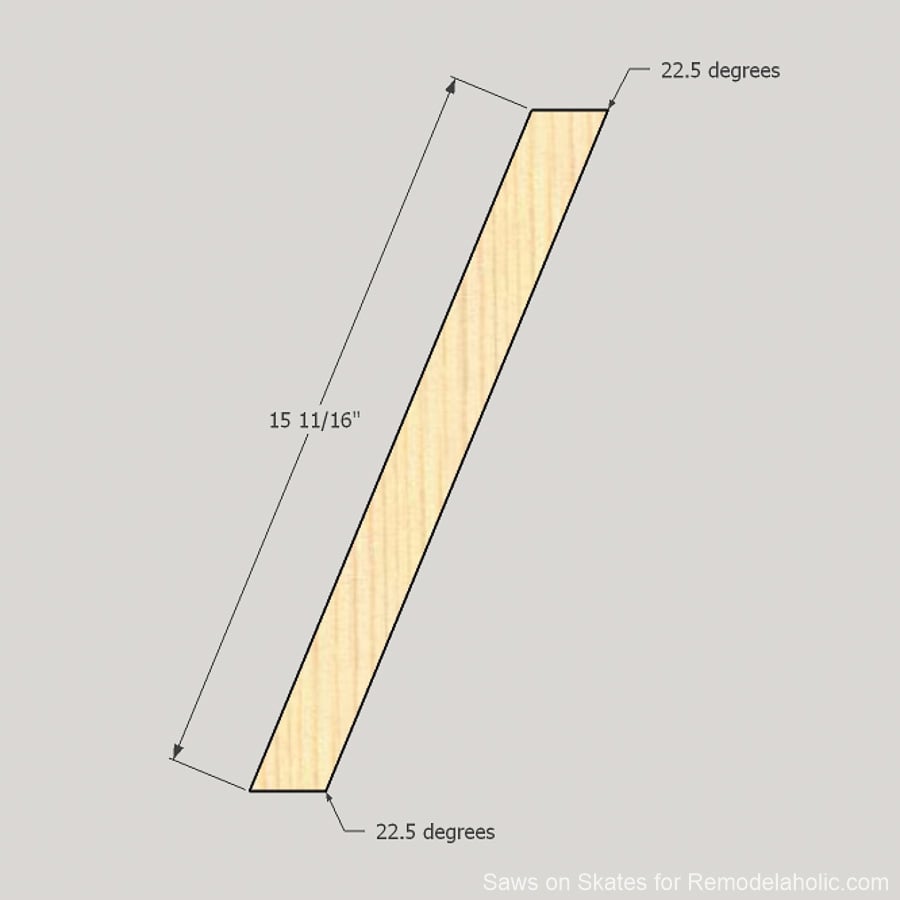
Step 17. Make and Attach the Back Bottom Rails. Cut a 22.5 degree angle on a 5/4×3, measure 2-3/8″ from the bottom of the angle and make 5 degree cut. Drill a pocket hole to attach the bottom rail to the leg. Repeat for the other rail. Be sure to make a right and a left.
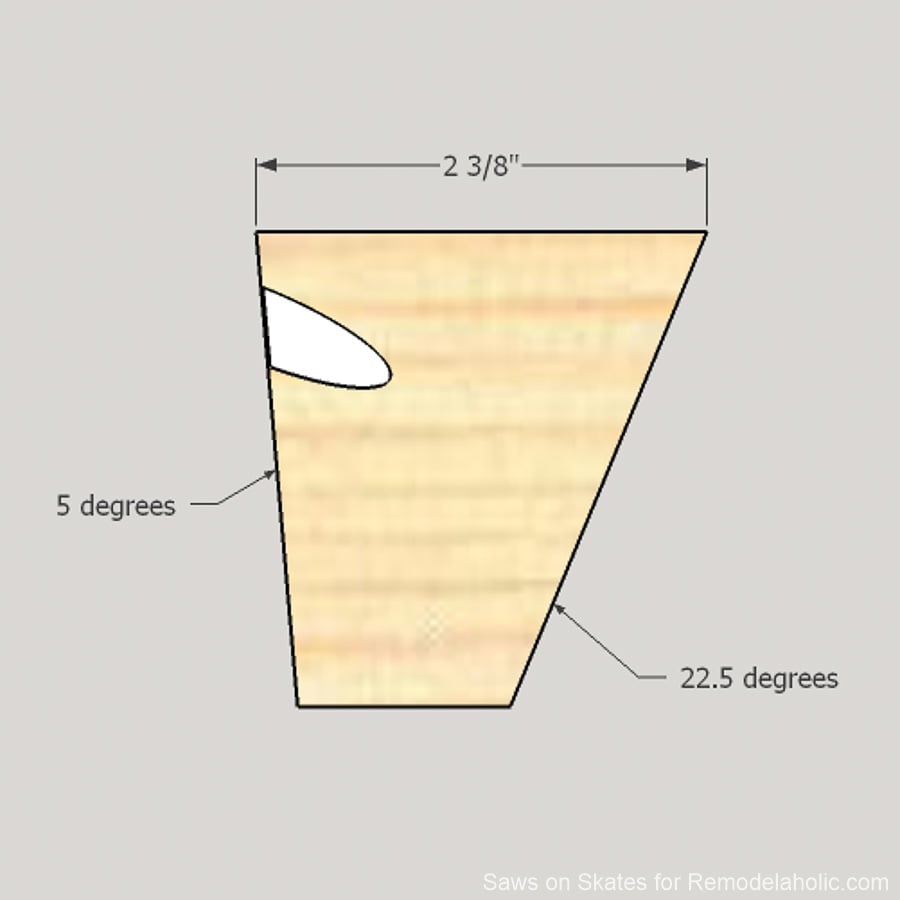
Apply glue to the front edge of the bottom rail, clamp to the front leg and attach using 1-1/2″ pocket screws. Then drill two pocket holes to attach the bottom rail to the stile. Be sure to position the pocket holes to avoid the pocket screw you just attached.

Step 18. Make and Attach the Back Top Rails. Cut a 22.5 degree angle on a 5/4×3, measure 7-3/16″ from the bottom of the angle and make a 5 degree cut. Drill pocket holes in each end. Repeat for the other rail. Be sure to make a right and a left.

Apply glue to the front edge of the top rail, clamp to the front leg and attach using 1-1/2″ pocket screws.
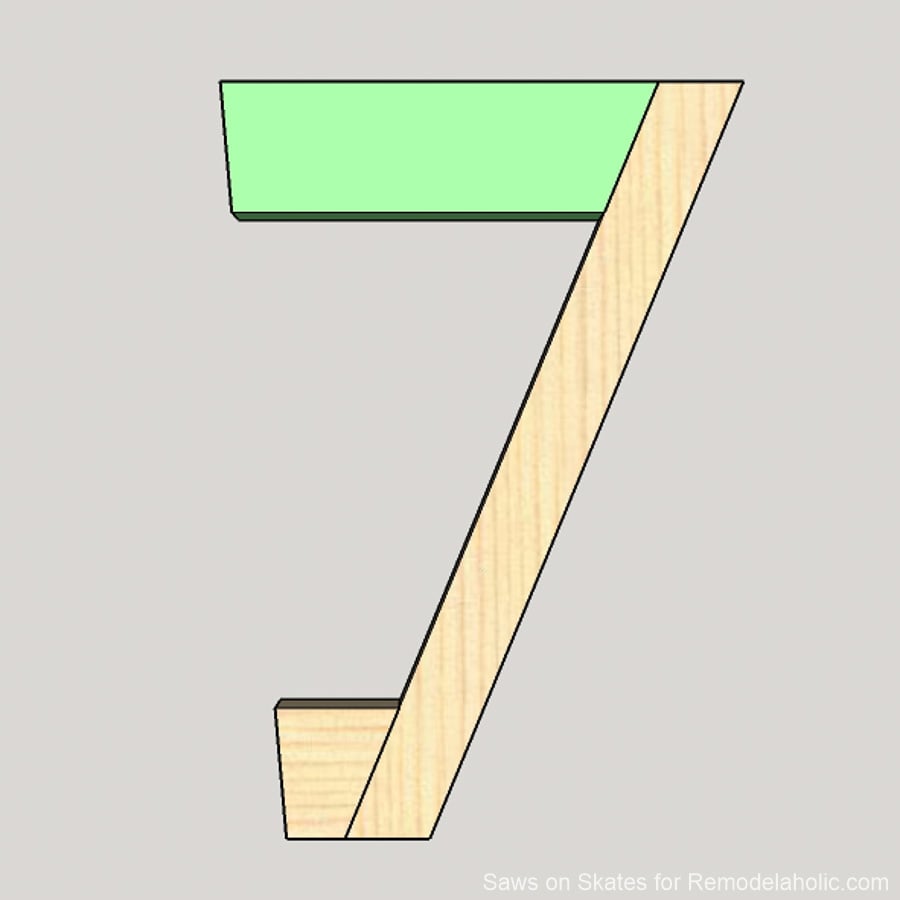
Step 19. Make the Back Stile. Cut a 5 degree angle on a 5/4×2, measure 38-1/8″ and cut a parallel 5 degree angle.
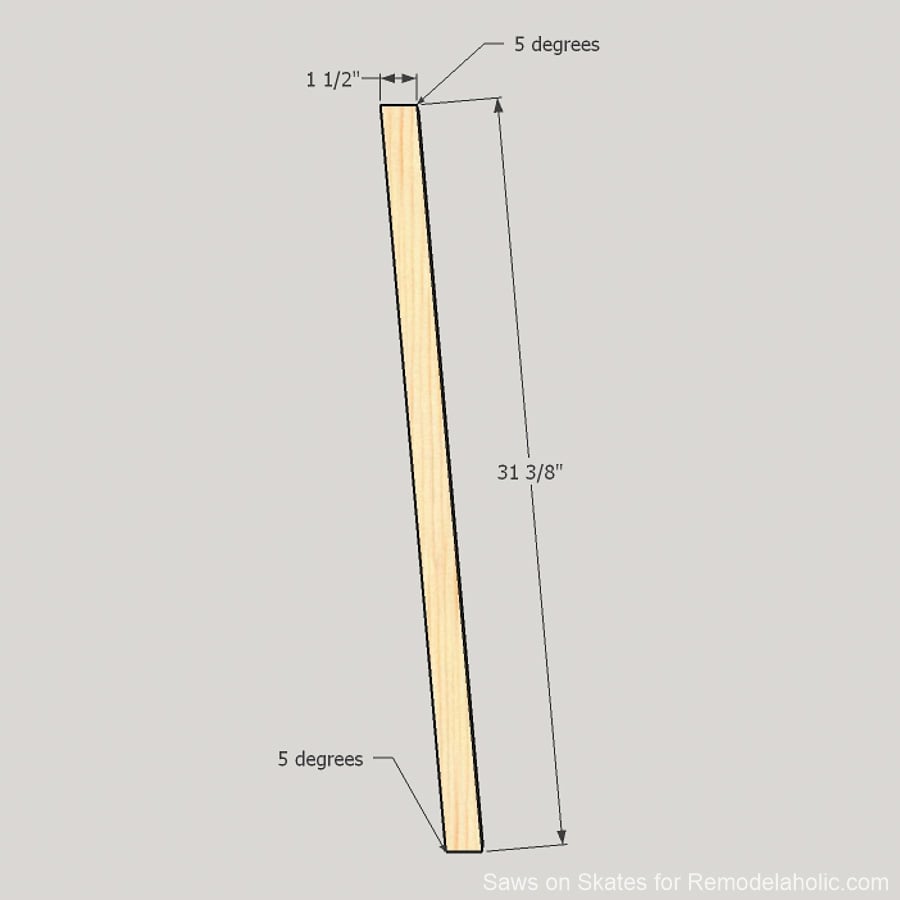
Step 20. Attach the Stile. Apply glue to the ends of the rails, clamp to the stile and attach using 1-1/2″ pocket screws.
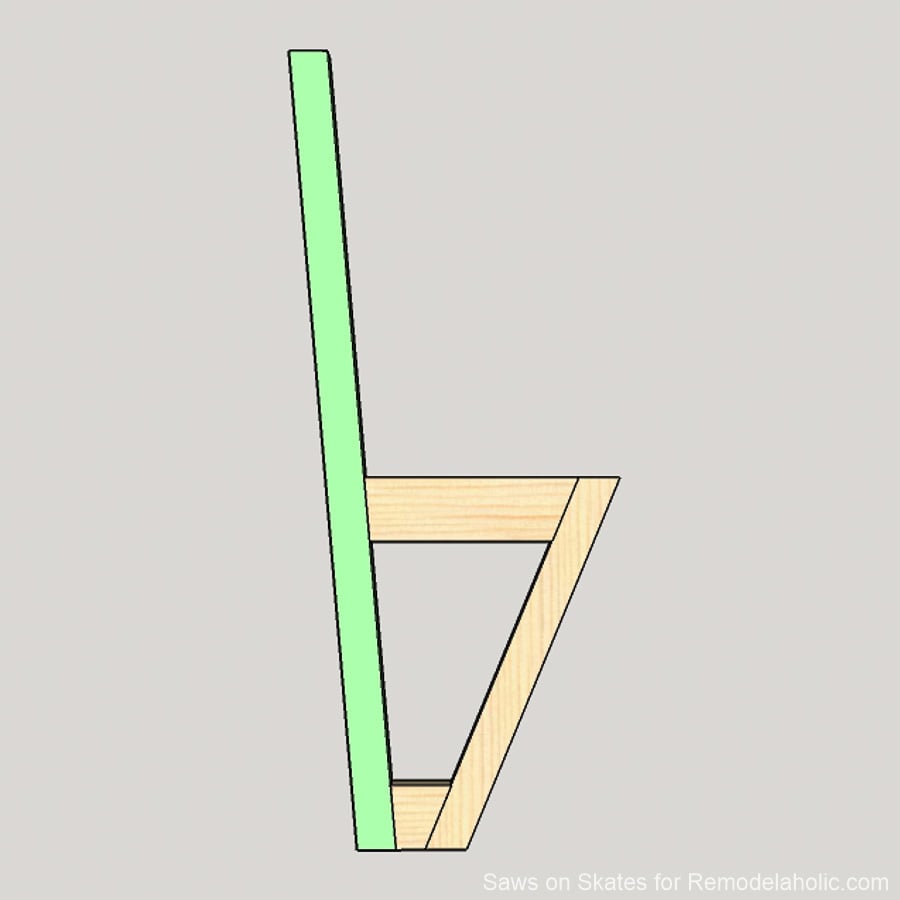
Step 21. Make and Attach the Back Middle Rails. Cut a 22.5 degree angle on a 5/4×3, measure 4-1/16″ from the bottom of the angle and make a 5 degree cut. Drill pocket holes in each end. Repeat for the other rail. Be sure to make a right and a left.
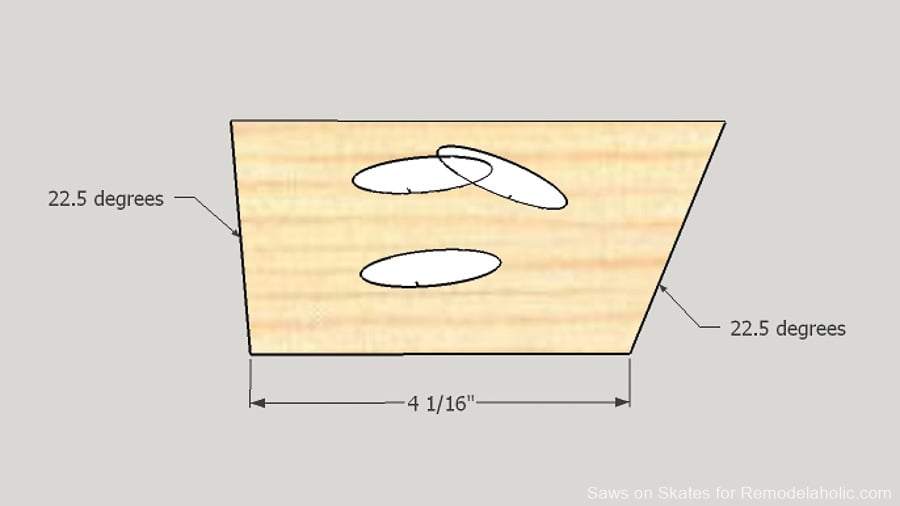
To help position the middle rail I cut a piece of scrap to 3-3/8″. Place the scrap on top of the bottom rail, apply glue to the ends of the middle and clamp in position. Attach using 1-1/2″ pocket screws.
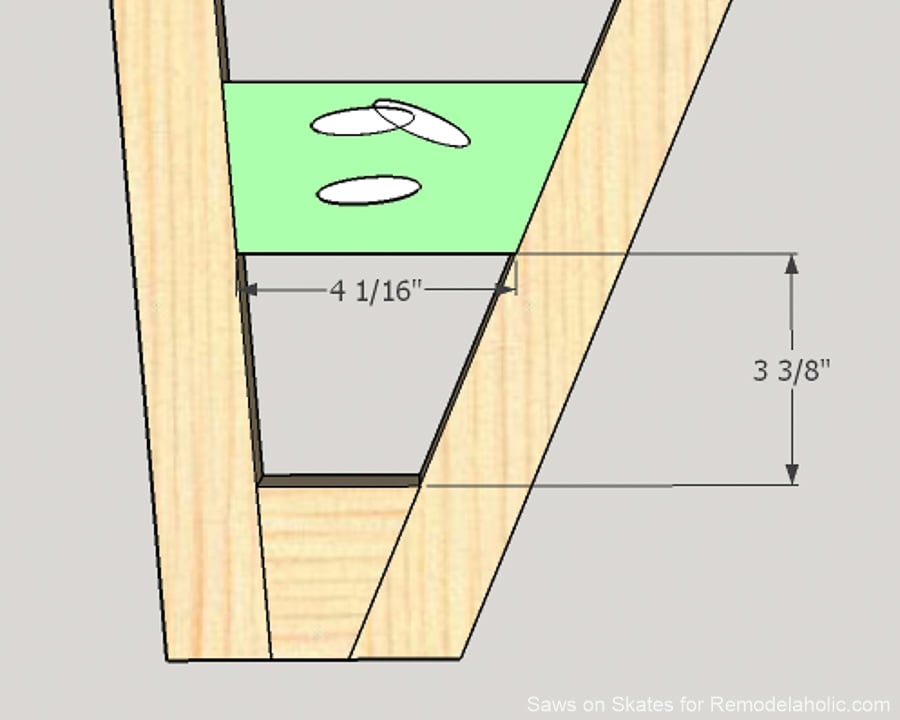
Step 22. Make and Attach the Cleats. For the best fit of the cleats, it’s best to place the wood in position, mark the angles and cut. The top cleat is flush with the top rail, the middle cleat is flush with the top of the middle rail and the bottom rail is flush with the bottom of the bottom rail.
Once the cleats are cut, drill countersink holes in the bottom edge of the top rail to attach the seat. Drill countersink holes in the top edge of the middle and bottom rails to attach the steps.
Then drill countersink holes in the faces to attach the cleats to the legs. Be sure to make a right and left.
Apply glue to the cleats, clamp in position and attach using 1-1/4″ wood screws.
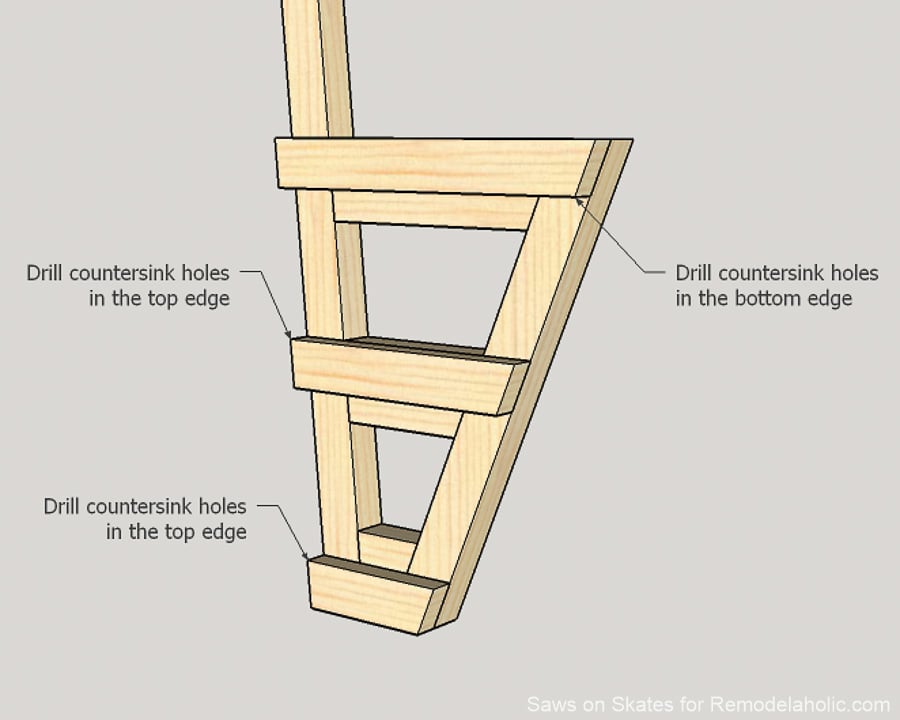
Step 23. Make and Attach the Middle Step. Cut a 1×4 to 13-1/4″. Cut a 1×5 to 13-1/4″. Apply glue to the edge, clamp and allow to dry.

Once the glue is dry, rip a 5 degree bevel on one edge. Place the 5 degree angle under the middle cleat and against the back of the leg assembly. Mark the angle on the front edge. Rip a 22.5 degree bevel at the mark. Clamp the step between the legs and attach using 2″ wood screws.

Step 24. Make and Attach the Bottom Step. Cut a 1×6 to 16″ and rip to 5″. Position on the legs, clamp in position and attach using 2″ wood screws.

Step 25. Make and Attach the Seat. Cut 2 pieces of 1×6 to 13-1/4″. Apply glue to the edge, clamp and allow to dry. Once the glue is dry, rip a 5 degree bevel on one edge. Place the 5 degree angle against the stile and mark the front edge. Rip the seat to this mark.

Step 26. Make and Install the Back Rails. Cut 3 pieces of 1×3 to 13-1/4″ and drill pocket holes in each end. I cut a few pieces of scrap wood to help position the rails. For the bottom rail, I cut a piece of 1×2 with a 90 degree cut at the bottom, measured 2-11/16″ and cut a 5 degree angle. For the remaining rails, I cut a piece of 1×2 with a 5 degree angle, measured 3-1/16″ and made a parallel 5 degree cut.
Place the 2-11/16″ scrap on top of the seat rail and temporarily attach to the stile with painter’s tape. Place the bottom rail on top of the scrap, center on the stile, and clamp in position. Place the 3-1/16″ scrap on top of the bottom rail and temporarily attach to the stile with painter’s tape. Place the middle rail on top of the scrap, center on the stile, and clamp in position. Place the 3-1/16″ scrap on top of the middle rail and temporarily attach to the stile with painter’s tape. Place the top rail on top of the scrap, center on the stile, and clamp in position. Attach using 1-1/4″ pocket screws.
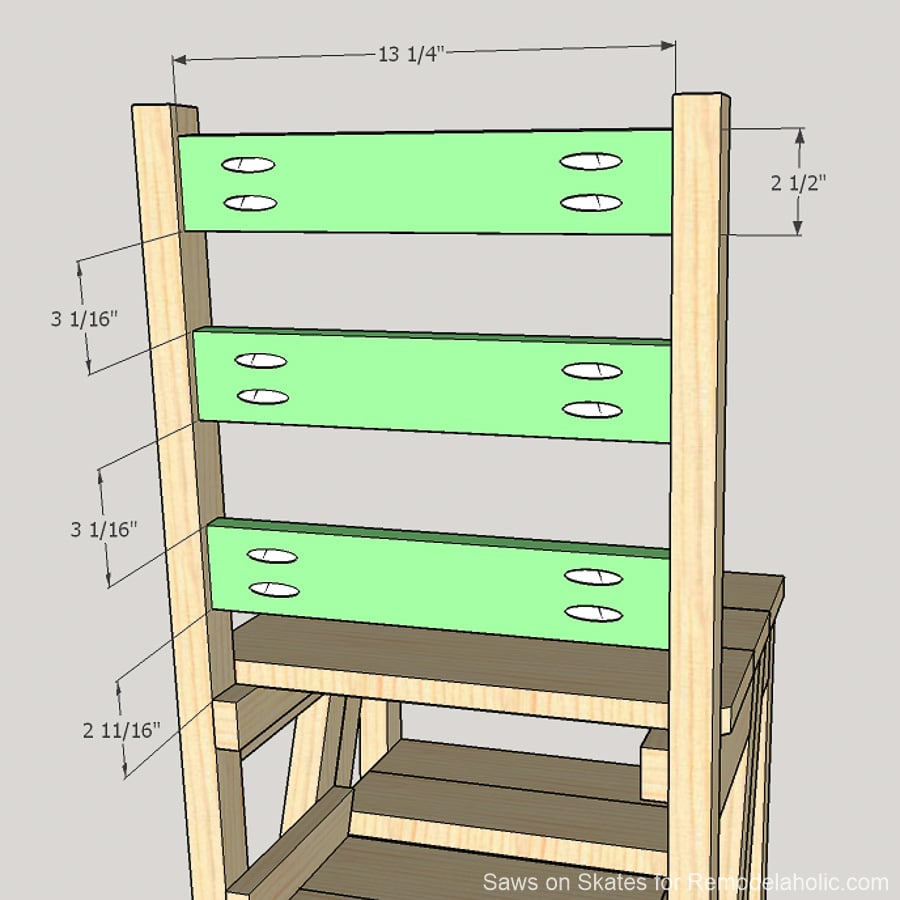
Step 27. Attach the Piano Hinge. Set the back leg assembly on top of the front leg assembly. Center the hinge and temporarily attach with painters tape. Attach using the screws included with the hinge.
Step 28. Fill the Back Rail Pocket Holes. The pocket holes in the back rails are exposed. For a more tailored look, I used my pocket hole plug cutter to make plugs to fill the holes. Apply glue to the pocket holes and insert the plugs. Trim flush once dry.
Step 29. Sand and Finish. Sand the ladder chair, then paint or stain to match your decor.
Thank you for stopping by to check out my DIY ladder chair. Please skate over to Saws on Skates to check out some of my other DIY furniture plans and projects!
Build a chunky wood nightstand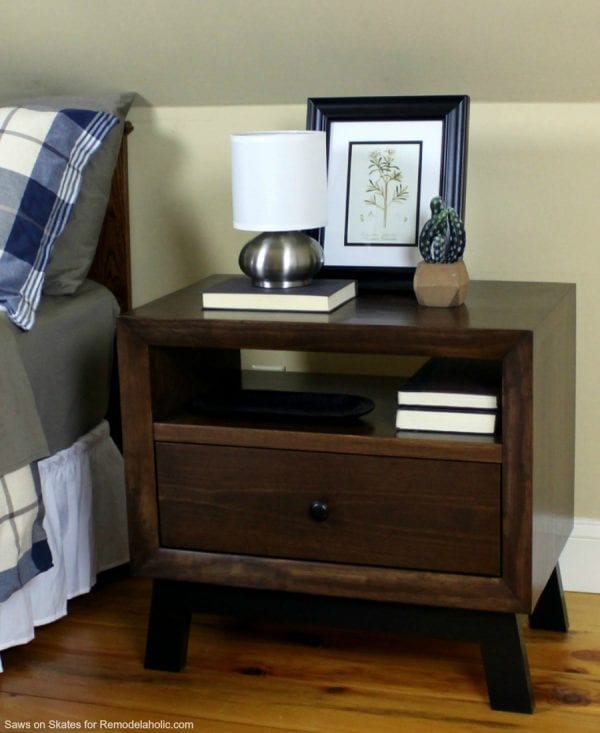 Build a small vanity with storage to fit an IKEA sink
Build a small vanity with storage to fit an IKEA sink Build a corner cabinet
Build a corner cabinet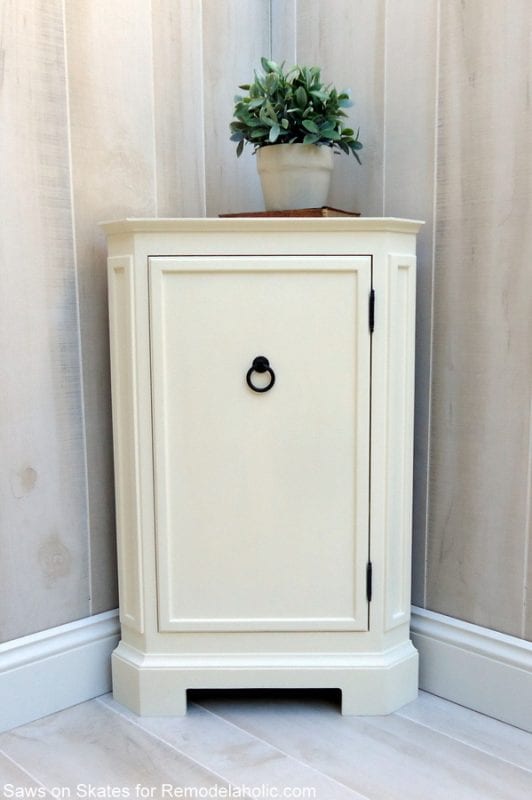
The post DIY Ladder Chair – A Modern Twist on an American Classic appeared first on Remodelaholic.

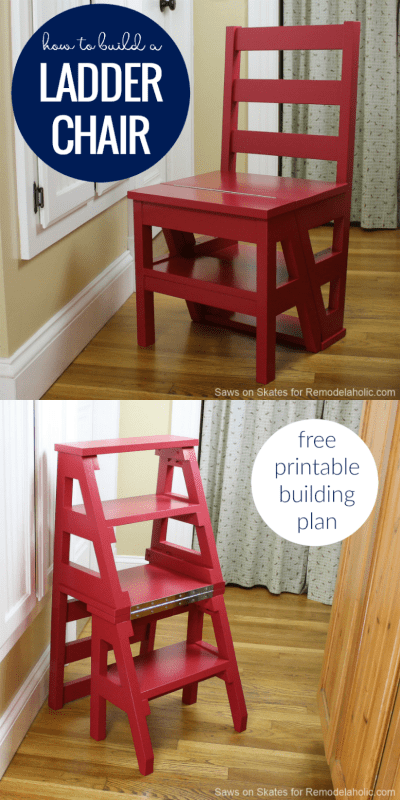

No comments:
Post a Comment